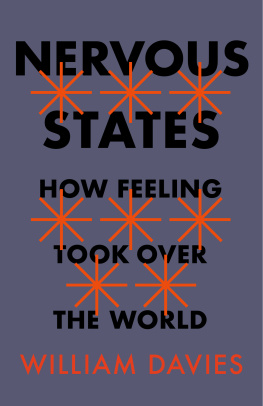Overcoming Anger and Irritability
Here you can read online Overcoming Anger and Irritability full text of the book (entire story) in english for free. Download pdf and epub, get meaning, cover and reviews about this ebook. year: 0, publisher: Robinson Publishing, genre: Religion. Description of the work, (preface) as well as reviews are available. Best literature library LitArk.com created for fans of good reading and offers a wide selection of genres:
Romance novel
Science fiction
Adventure
Detective
Science
History
Home and family
Prose
Art
Politics
Computer
Non-fiction
Religion
Business
Children
Humor
Choose a favorite category and find really read worthwhile books. Enjoy immersion in the world of imagination, feel the emotions of the characters or learn something new for yourself, make an fascinating discovery.
Overcoming Anger and Irritability: summary, description and annotation
We offer to read an annotation, description, summary or preface (depends on what the author of the book "Overcoming Anger and Irritability" wrote himself). If you haven't found the necessary information about the book — write in the comments, we will try to find it.
Unknown: author's other books
Who wrote Overcoming Anger and Irritability? Find out the surname, the name of the author of the book and a list of all author's works by series.
Overcoming Anger and Irritability — read online for free the complete book (whole text) full work
Below is the text of the book, divided by pages. System saving the place of the last page read, allows you to conveniently read the book "Overcoming Anger and Irritability" online for free, without having to search again every time where you left off. Put a bookmark, and you can go to the page where you finished reading at any time.
Font size:
Interval:
Bookmark:
DR WILLIAM DAVIES graduated in psychology from University College London and completed his postgraduate clinical training at the University of Birmingham, England. He is a Consultant Clinical Psychologist and head of APT, The Association for Psychological Therapies, one of the UKs leading providers of training for Mental Health professionals. Dr Davies was previously Head of Forensic Psychology in the Trent Regional Secure Unit and Head of Psychology at St Andrews Hospital, Northampton a national resource for patients needing specialised care. Dr Davies has written and taught numerous courses and workshops, most notably The RAID Course for working with extreme behavior, and Preventing Face-to-Face Violence, each of which has been attended by well over 10,000 professionals.
The aim of the Overcoming series is to enable people with a range of common problems and disorders to take control of their own recovery program. Each title, with its specially tailored program, is devised by a practising clinician using the latest techniques of cognitive behavioral therapy techniques which have been shown to be highly effective in helping people overcome their problems by changing the way they think about themselves and their difficulties. The series was initiated in 1993 by Peter Cooper, Professor of Psychology at Reading University in the UK whose book on overcoming bulimia nervosa and binge-eating continues to help many people in the USA, the UK, Australasia and Europe. Many books in the Overcoming series are recommended by the UK Department of Health under the Books on Prescription scheme.
Titles in the series include:
OVERCOMING ANGER AND IRRITABILITY
OVERCOMING ANOREXIA NERVOSA
OVERCOMING ANXIETY
OVERCOMING BODY IMAGE PROBLEMS
OVERCOMING BULIMIA NERVOSA AND BINGE-EATING
OVERCOMING CHILDHOOD TRAUMA
OVERCOMING CHRONIC FATIGUE
OVERCOMING CHRONIC PAIN
OVERCOMING COMPULSIVE GAMBLING
OVERCOMING DEPERSONALIZATON AND FEELINGS OF UNREALITY
OVERCOMING DEPRESSION
OVERCOMING GRIEF
OVERCOMING HEALTH ANXIETY
OVERCOMING INSOMNIA AND SLEEP PROBLEMS
OVERCOMING LOW SELF-ESTEEM
OVERCOMING MOOD SWINGS
OVERCOMING OBSESSIVE COMPULSIVE DISORDER
OVERCOMING PANIC
OVERCOMING PARANOID AND SUSPICIOUS THOUGHTS
OVERCOMING PROBLEM DRINKING
OVERCOMING RELATIONSHIP PROBLEMS
OVERCOMING SEXUAL PROBLEMS
OVERCOMING SOCIAL ANXIETY AND SHYNESS
OVERCOMING STRESS
OVERCOMING TRAUMATIC STRESS
OVERCOMING WEIGHT PROBLEMS
OVERCOMING OUR CHILDS FEARS AND WORRIES
OVERCOMING YOUR CHILDS SHYNESS AND SOCIAL ANXIETY
OVERCOMING YOUR SMOKING HABIT
All titles in the series are available by mail order.
Please see the order form at the back of this book.
www.overcoming.co.uk
ROBINSON
London
Constable & Robinson Ltd
3 The Lanchesters
162 Fulham Palace Road
London W6 9ER
www.constablerobinson.com
First published in the UK by Robinson in 2000
This edition published by Robinson,
an imprint of Constable & Robinson Ltd, 2009
Copyright William Davies 2000, 2009
The right of William Davies to be identified as author of this work has been asserted by him in accordance with the Copyright, Designs and Patents Act, 1988.
All rights reserved. This book is sold subject to the condition that it shall not, by way of trade or otherwise, be lent, re-sold, hired out or otherwise circulated in any form of binding or cover other than that in which it is published and without a similar condition including this condition being imposed on the subsequent purchaser.
A copy of the British Library Cataloguing in Publication
Data is available from the British Library.
Important Note
This book is not intended to be a substitute for medical advice or treatment.
Any person with a condition requiring medical attention should consult a qualified medical practitioner or suitable therapist.
ISBN 978-1-84901-131-0
Printed and bound in the EU
1 3 5 7 9 10 8 6 4 2
Reading through previous Acknowledgements contained in books in this series I see that the form is to thank all the wonderful people that have written about and researched Cognitive Therapy. Quite right too, I hope that is taken as read. More immediately, however, I would like to thank Amy and Helen for the work they put in to typing this book at very short notice, under great pressure, and with very little irritation! (One or two assertive comments perhaps, but probably well justified!) Also to Paul Gilbert for pushing forward what he terms my approachable writing style and, just as much, to the publishers for creating a series that is so relevant and important that it makes one enthusiastic to write for it. Finally, although I cant imagine they will ever read this, an acknowledgement to Danny and Vicky who feature in one of the many case studies and who may well be recognised for the well-known characters they are. A special word of thanks to them for the endless entertainment they provide, and of reassurance that their inclusion is not yet another dig at them, but is simply intended to create an entirely non-malicious smile in the reader.
Why a cognitive behavioral approach?
Over the past two or three decades, there has been something of a revolution in the field of psychological treatment. Freud and his followers had a major impact on the way in which psychological therapy was conceptualized, and psychoanalysis and psychodynamic psychotherapy dominated the field for the first half of this century. So, long-term treatments were offered which were designed to uncover the childhood roots of personal problems offered, that is, to those who could afford it. There was some attempt by a few health service practitioners with a public conscience to modify this form of treatment (by, for example, offering short-term treatment or group therapy), but the demand for help was so great that this had little impact. Also, whilst numerous case histories can be found of people who are convinced that psychotherapy did help them, practitioners of this form of therapy showed remarkably little interest in demonstrating that what they were offering their patients was, in fact, helpful.
As a reaction to the exclusivity of psychodynamic therapies and the slender evidence for its usefulness, in the 1950s and 1960s a set of techniques was developed, broadly collectively termed behavior therapy. These techniques shared two basic features. First, they aimed to remove symptoms (such as anxiety) by dealing with those symptoms themselves, rather than their deep-seated underlying historical causes. Second, they were techniques, loosely related to what laboratory psychologists were finding out about the mechanisms of learning, which were formulated in testable terms. Indeed, practitioners of behavior therapy were committed to using techniques of proven value or, at worst, of a form which could potentially be put to the test. The area where these techniques proved of most value was in the treatment of anxiety disorders, especially specific phobias (such as fear of animals or heights) and agoraphobia, both notoriously difficult to treat using conventional psychotherapies.
After an initial flush of enthusiasm, discontent with behavior therapy grew. There were a number of reasons for this, an important one of which was the fact that behavior therapy did not deal with the internal thoughts which were so obviously central to the distress that patients were experiencing. In this context, the fact that behavior therapy proved so inadequate when it came to the treatment of depression highlighted the need for major revision. In the late 1960s and early 1970s a treatment was developed specifically for depression called cognitive therapy. The pioneer in this enterprise was an American psychiatrist, Professor Aaron T. Beck, who developed a theory of depression which emphasized the importance of peoples depressed styles of thinking. He also specified a new form of therapy. It would not be an exaggeration to say that Becks work has changed the nature of psychotherapy, not just for depression but for a range of psychological problems.
Next pageFont size:
Interval:
Bookmark:
Similar books «Overcoming Anger and Irritability»
Look at similar books to Overcoming Anger and Irritability. We have selected literature similar in name and meaning in the hope of providing readers with more options to find new, interesting, not yet read works.
Discussion, reviews of the book Overcoming Anger and Irritability and just readers' own opinions. Leave your comments, write what you think about the work, its meaning or the main characters. Specify what exactly you liked and what you didn't like, and why you think so.











